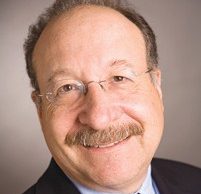
Henry Dubroff
More than a decade ago in San Francisco, Michael Rosenfeld found a strategic solution to the problem of value investing in California’s pricey real estate markets — he made a bold bet on restoring classic hotel properties that paid off.
On Santa Barbara’s waterfront, he has adapted that strategy with a mix of new construction and restoration at the Hotel Californian, a $200 million project that is in the countdown to opening day. I’ve walked through the Californian twice during construction and always wondered about the person behind it.
During an extended conversation at the Century City offices of Woodridge Capital Partners, his flagship company, we talked about real estate, value investing in the 21st century and the future of the Central Coast economy.
Rosenfeld, 55, caught the attention of our colleagues at the San Francisco Business Times when he bought and renovated the landmark Fairmont Hotel. That was followed by acquisitions of other classic properties: Stanford Court and the Mark Hopkins.
In greater Los Angeles, he’s best known for the $2 billion-plus project to redevelop the Century Plaza hotel site, adding residences and two large towers that will add a new dimension to the Century City property market.
But it became clear during our 90-minute conversation that the Californian has become a personal favorite, drawing his attention down to picking the tiles for the Moroccan-themed lobby. He said that when he first saw the vacant site, he saw an opportunity to change the context of the city’s waterfront without disrupting its architectural core.
“There are some unique situations right in front of us,” he said, that are masked by thinking that’s tied up in the status quo. Rosenfeld talks a lot about the “privilege” of working on historic properties, and my takeaway is that he enjoys the challenge of working in places like Santa Barbara, with its daunting architectural reviews and development guidelines.
His design won the support of outgoing Mayor Helene Schneider, who staked quite bit of her legacy on the new attractions on the waterfront: the Californian, the nearby Moxi museum and the Funk Zone arts and entertainment district. Not to mention the tax revenue that the hotel’s restaurants and 135 high-priced rooms will bring in.
Rosenfeld took over the project in 2011, when it had languished since the recession and before as the failed La Entrada. The fact that he put his own capital in first to start the Californian gave him instant credibility and a fair amount of control.
He’s gone back to the name of The Californian, one that brings up images of the classic postcards of people arriving by train from the East Coast and Midwest to enjoy the California coast. That’s no accident: Rosenfeld is convinced that the re-invented Californian will be a magnet for millennials who will ditch their cars in LA, arrive by rail and get around Santa Barbara on bikes and ride-share services.
Getting the Californian built in just six years is a speed-of-light experience for Central Coast development. And it was done with less drama than Rick Caruso’s battles with the neighbors over the beachfront Rosewood Miramar resort a few miles away. Rosenfeld seems to have taken a lesson from the late UCLA basketball coach John Wooden: “Be quick, but don’t hurry.”
Rosenfeld’s search for value in the Santa Barbara market, and perhaps elsewhere on the Central Coast, is not yet over.
His team is already working on a rental project on Anacapa Street and my guess is that as Santa Barbara loosens up the rules for residential development along State Street, other cities will begin to rethink their rules for urban dwellings on the Central Coast.
For Rosenfeld and Woodridge, that will mean new opportunities to apply his principles of investing to communities that have largely shunned development for two decades. You never know what sort of value might be hidden in plain sight.
• Reach Editor Henry Dubroff at hdubroff@pacbiztimes.com.






 Print
Print Email
Email

















